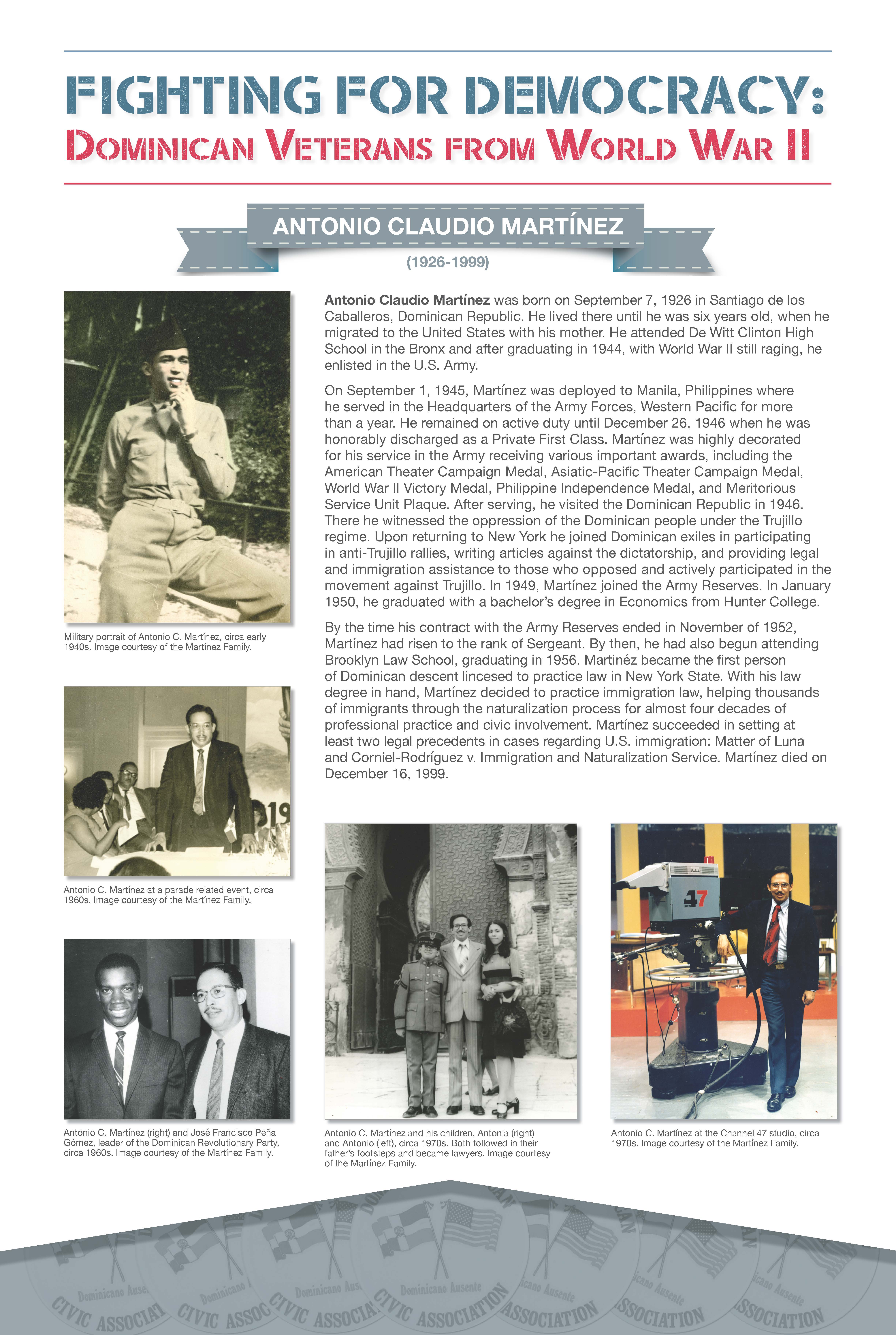Antonio Claudio Martínez
Title
Antonio Claudio Martínez
Subject
Dominican Immigrants|Dominican Veterans|Dominicans in Politics|Dominicans in the United States|Rafael Leónidas Trujillo|World War II
Creator
CUNY Dominican Studies Institute
Source
The Martínez Family
Date
1926-1999
Contributor
Edward De Jesús, Principal Investigator / Curator
Ruth Lizardi, Coordinator / Assistant Curator
Dr. Ramona Hernández, Director, CUNY DSI & Professor of Sociology, The City College of New York
Anthony Stevens-Acevedo, Assistant Director
Idilio Gracia Peña, Chief Archivist
Sarah Aponte, Chief Librarian
Jessy J. Pérez, Archivist
Jhensen Ortiz, Assistant Librarian
Groana G. Meléndez, Photography Editor
Norma Guzmán and Donald Mounts, Researchers
Dr. Tim Williams, Senior Editor
Mariel Acosta, Katie Duarte, Shaday Fermín, and Anthony Stevens-Acevedo, Editors
John P. Bimbiras, Edward De Jesús, Jhensen Ortiz, Jessy J. Pérez, Sophia Monegro and Natalie A. Studt, Biography Text Writers
Isabelia Herrera, Grant Writer
Javier Pichardo, Graphic Artist
Sponsor: CUNY Dominican Studies Institute
Sponsor: Colin Powell School for Civic and Global Leadership at The City College of New York
Sponsor: Latino Americans: 500 Years - National Endowment for the Humanities
Sponsor: American Library Association
Sponsor: New York City Council
Sponsor: Smithsonian Latino Center
Sponsor: Center for Puerto Rican Studies (Centro)
Sponsor: The Documentary Forum - CCNY Center for Film, Journalism, and Interactive Media
Sponsor: Dominican Students Association
Format
24" x 36" panel
Language
English
Biographical Text
Antonio Claudio Martínez was born on September 7, 1926 in Santiago de los Caballeros, Dominican Republic. He lived there until he was six years old, when he migrated to the United States with his mother. He attended De Witt Clinton High School in the Bronx and after graduating in 1944, with World War II still raging, he enlisted in the U.S. Army.
On September 1, 1945, Martínez was deployed to Manila, Philippines where he served in the Headquarters of the Army Forces, Western Pacific for more that a year. He remained on active duty until December 26, 1946 when he was honorably discharged as a private First Class. Martínez was highly decorated for his service in the Army receiving various important awards, including the American Theater Campaign Medal, Asiatic-Pacific theater Campaign Medal, World War II Victory Medal, Philippine Independence Medal, and Meritorious Service Unit Plague. After serving, he visited the Dominican republic in 1946. There he witnessed the oppression of the Dominican people under the Trujillo regime. Upon returning to New York he joined Dominican exiles in participating in anti-Trujillo rallies, writing articles against the dictatorship, and providing legal and immigration assistance to those who opposed and actively participated in the movement against Trujillo. In 1949, Martinez joined the Army Reserves. In January 1950, he graduated with a bachelor's degree in Economics from Hunter College.
By the time his contract with the Army Reserves ended in November of 1952, Martinez had risen to the rank of Sergeant. By then, he had also begun attending Brooklyn Law School, graduating in 1956. Martínez became the first person of Dominican descent licensed to practice law in New York State. With his law degree in hand, Martínez decided to practice immigration law, helping thousands of immigrants through the naturalization process for almost four decades of professional practice and civic involvement. Martínez succeeded in setting at least two legal practice and civic involvement. Martínez succeeded in setting at least two legal precedents in cases regarding U.S. immigration: Matter of Luna and Corniel-Rodriguez v. Immigration and Naturalization Service. Martínez died on December 16, 1999.
On September 1, 1945, Martínez was deployed to Manila, Philippines where he served in the Headquarters of the Army Forces, Western Pacific for more that a year. He remained on active duty until December 26, 1946 when he was honorably discharged as a private First Class. Martínez was highly decorated for his service in the Army receiving various important awards, including the American Theater Campaign Medal, Asiatic-Pacific theater Campaign Medal, World War II Victory Medal, Philippine Independence Medal, and Meritorious Service Unit Plague. After serving, he visited the Dominican republic in 1946. There he witnessed the oppression of the Dominican people under the Trujillo regime. Upon returning to New York he joined Dominican exiles in participating in anti-Trujillo rallies, writing articles against the dictatorship, and providing legal and immigration assistance to those who opposed and actively participated in the movement against Trujillo. In 1949, Martinez joined the Army Reserves. In January 1950, he graduated with a bachelor's degree in Economics from Hunter College.
By the time his contract with the Army Reserves ended in November of 1952, Martinez had risen to the rank of Sergeant. By then, he had also begun attending Brooklyn Law School, graduating in 1956. Martínez became the first person of Dominican descent licensed to practice law in New York State. With his law degree in hand, Martínez decided to practice immigration law, helping thousands of immigrants through the naturalization process for almost four decades of professional practice and civic involvement. Martínez succeeded in setting at least two legal practice and civic involvement. Martínez succeeded in setting at least two legal precedents in cases regarding U.S. immigration: Matter of Luna and Corniel-Rodriguez v. Immigration and Naturalization Service. Martínez died on December 16, 1999.
Citation
CUNY Dominican Studies Institute, “Antonio Claudio Martínez,” Fighting for Democracy: Dominican Veterans from World War II, accessed November 21, 2024, https://dsi.ccnydigitalscholarship.org/dominican-veterans-wwii/items/show/66.

